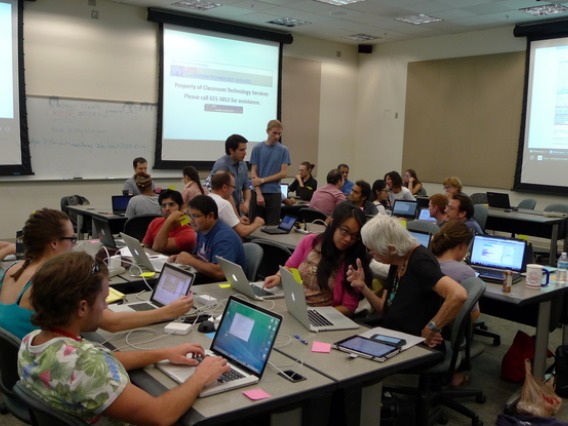Translations at The Carpentries
Joel Nitta
Chiba University
https://www.joelnitta.com
https://joelnitta.github.io/bioc_cab_2023-07-14
What is The Carpentries?
- A non-profit supporting free (or very low cost) workshops to learn best practices for research computing

Example Carpentries lesson

How to translate?
Not as simple as just re-writing text in another language as if translating a novel
Carpentries lessons are technical documents (rendered using software) and therefore present unique challenges
![]()
Challenges in technical translation
- Need to be able to
- update translation when original changes
- deal with source code vs. rendered version
- (I am focusing on translating lessons, i.e., teaching materials. Translating contents of R packages is a different matter.)
Example Carpentries lesson (again)

https://carpentries-incubator.github.io/targets-workshop/basic-targets.html#run-the-workflow
Example Carpentries lesson (code)

What is technical translation anyways?
Two aspects:
internationalization (
i18n): Providing the framework to support translation (requires technical knowledge)localization (
l10n): Actually translating strings (requires linguistic knowlege)

Past approach (“Styles” format)
The old Carpentries lesson format is called the “Styles” format
The Styles format is based on Jekyll (and some other tools)
Translation system1 designed by David Pérez-Suárez used a tool called PO4gitbook
Past approach (“Styles” format)

Past approach (“Styles” format)
All translations controlled from a central repo* with submodules for each lesson
Rendering not straightforward
- (most) Translators can’t “preview” lesson
Various methods used to localize
- transifex (cloud-based)
- POedit (local text editor)
- github (online code review; used by JA community)
New approach (“Workbench” format)
The upcoming Carpentries lesson format is called “Workbench”, developed by Zhian Kamvar
The Workbench format is based on R and pandoc-flavoured markdown
- Rendering of lessons is greatly simplified
- I am developing an R package to facilitate translating with the Workbench format called dovetail
dovetail
Each translation is contained within each lesson1
Rendering is easily accomplished locally by the translator
Plan to have a standard system for localization (e.g., pushing/pulling from crowdin)
dovetail
library(dovetail)
# Copy (untranslated) files needed for rendering lesson
create_locale("ja")
# Create PO files ----
create_po_for_locale("ja")
# Edit PO files ----
# for example, with
# usethis::edit_file("po/ja/01-introduction.po")
# Translate md files ----
# translate all (R)md files at once to `./locale/{lang}/`
translate_md_for_locale("ja")
# Build translated lesson ----
sandpaper::build_lesson("locale/ja/")dovetail
Output of translation
|-- CONTRIBUTING.md # - Carpentries Rules for Contributions
|-- README.md # - Describes lesson
...
|-- po # - NEW, contains PO files for translation
| `-- ja/
| |-- 00-introducition.po
| |-- CONTRIBUTING.po
| |...
|-- locale # - NEW, contains translated files
| `-- ja/
| |-- CONTRIBUTING.md # - NEW, translated markdown files
| |-- site/ # - NEW, translated, rendered site
| |-- built/
| |... dovetail design philosophy
- Make it easier for maintainer to maintain (
i18n)- Not dependent on one person maintaining one central repo
- Make it easier for translators to translate (
l10n)- Requires minimal technical knowlege to participate (don’t need git)
Promote participation in Carpentries by translating!
- By making translation (
l10n) simple, we can encourage participation and grow local communities

